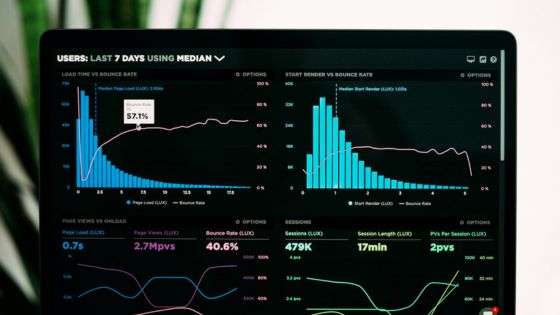Data driven decision making

Data-Driven: Unleashing the Power of Information for Smarter Decisions
Imagine navigating a busy city at night without a map or GPS. Confusing, right? Data, in today’s information age, is like that map – it guides us towards informed decisions in a world overflowing with choices. The concept of “data-driven” isn’t just a fancy buzzword; it’s a powerful approach that can revolutionize everything from your morning commute (traffic app, anyone?) to the way businesses operate. Today we going to know what is data driven decision making, how its work?
Firs what exactly does “data-driven” mean? Let’s break it down.
Decoding Data-Driven: From Numbers to Powerful Insights
Think of data as a treasure trove of information – customer demographics, website traffic patterns, sales figures. Being data-driven means going beyond simply collecting this data. It’s about analyzing it, interpreting its meaning, and using those insights to make strategic choices.
Here’s the analogy: Imagine a delicious pot of stew simmering on the stove. The ingredients (data) are there, but to truly enjoy it, you need to simmer and season it (analysis and interpretation) to create a flavorful dish (actionable insights).
Data-driven decision-making isn’t about gut feelings or hunches. It’s about using cold, hard facts to illuminate the path forward.
Data Driven Decision Making? Unveiling the Benefits
So, why should you embrace a data-driven approach? Here are some compelling reasons:
- Sharpened Decision-Making: Data provides a clear picture, helping you make informed choices that are more likely to succeed. Think of it as having a roadmap instead of blindly wandering through the forest.
- Enhanced Customer Experience: Data helps you understand your customers better. Analyze their behavior, preferences, and pain points to tailor your products, services, and marketing efforts for maximum impact.
- Improved Efficiency: Data can pinpoint areas for streamlining operations. Identify processes that are slow or cumbersome and optimize them for better efficiency, saving you time and resources.
- Boosts in ROI: Data-driven marketing is laser-focused. You target the right audience with the right message at the right time, maximizing your return on investment. It’s like a well-aimed arrow hitting the bullseye, compared to randomly firing arrows in the dark.
- Competitive Advantage: In today’s data-rich world, businesses that leverage insights outperform those who rely on intuition alone. Data gives you a leg up, allowing you to anticipate trends, adapt to market changes, and stay ahead of the curve.
Beyond the Basics: Embracing a Data-Driven Culture
Here’s the key takeaway: being data-driven isn’t just about having access to information. It’s about fostering a culture that values data and uses it to its full potential. Here’s how to cultivate that culture:
- Invest in Data Infrastructure: Having the right tools and technology is crucial. This could involve data storage solutions, analytics platforms, and business intelligence software.
- Empower Your Team: Equip your employees with the skills to understand and utilize data. Training sessions on data analysis and interpretation can empower them to make data-driven decisions in their roles.
- Break Down Silos: Encourage collaboration between departments. Data shouldn’t be siloed; it should flow freely to provide a holistic view of your business.
- Embrace a Growth Mindset: Data is dynamic – it’s constantly evolving. Be open to learning from data insights and adapting your strategies as needed.
Examples in Action: Witnessing the Power of Data
Let’s see how data-driven strategies translate into real-world scenarios:
- E-commerce Personalization: Imagine an online store that analyzes your browsing history and recommends products you’re likely to be interested in. This data-driven approach personalizes the shopping experience and increases the chances of conversion.
- Targeted Marketing Campaigns: Data analysis can reveal valuable customer demographics and online behavior patterns. This allows businesses to tailor their marketing campaigns to specific audience segments, maximizing their reach and effectiveness.
- Data-Driven Inventory Management: Businesses can analyze past sales data and customer trends to predict future demand. By optimizing inventory levels, avoiding stock outs, and having the right products on hand when customers need them, they ensure customer satisfaction.
A few examples are given here, but there are countless possibilities. Data can be harnessed to improve everything from product development to customer service, risk management to financial forecasting.
Deep Dive: Delving into Specific Data-Driven Applications
While we’ve explored the general benefits of data-driven decision making, let’s take a deeper dive into some specific applications across different industries:
Marketing: Gone are the days of mass marketing campaigns. Data empowers marketers to personalize experiences, target niche audiences with laser focus, and measure campaign effectiveness with pinpoint accuracy. Imagine social media ads tailored to individual preferences or email marketing campaigns that speak directly to a customer’s needs.
Finance: Data is the bedrock of sound financial decisions. Banks use it to assess creditworthiness, businesses leverage it for risk management and investment strategies, and financial institutions rely on it for fraud detection. Data analysis helps predict market trends, identify potential financial risks, and optimize resource allocation.
Healthcare: The healthcare industry is undergoing a data revolution. Electronic health records, medical imaging data, and genetic information are all valuable resources for personalized medicine, disease prevention, and drug development. Data analysis can help identify at-risk patients, predict potential outbreaks, and even tailor treatment plans to individual patients.
Human Resources: Data can be a powerful tool for talent acquisition and management. Applicant tracking systems leverage data to streamline the hiring process, while performance metrics help identify top performers and areas for employee development. Data-driven HR strategies can lead to a more efficient and effective workforce.
Customer Service: Businesses are increasingly using data to personalize the customer service experience. Sentiment analysis of social media interactions helps identify customer pain points, while chatbots powered by AI can provide real-time support based on customer data. Data can also be used to identify trends in customer inquiries, allowing businesses to proactively address potential issues.
These are just a few examples, but the potential applications of data-driven decision making are vast and constantly evolving. As we move forward in a data-rich world, the ability to harness the power of information will be a key differentiator for businesses across all industries.
Challenges and Considerations: Navigating the Data Frontier
While the potential of data-driven decision making is undeniable, it’s not without its challenges. Here are some key considerations to navigate the data frontier effectively:
- Data Quality and Bias: “Garbage in, garbage out” applies to data as well. An incomplete or inaccurate set of data can lead to inaccurate conclusions. It’s crucial to ensure data quality and be aware of potential biases that may skew your analysis.
- Data Privacy Concerns: As businesses collect and analyze more data, concerns about privacy arise. It’s essential to have robust data security measures in place and be transparent with your customers about how their data is used.
- The Human Factor: Data is powerful, but it shouldn’t replace human judgment and experience. Use data insights to inform your decisions, but don’t neglect the value of intuition and creativity.
- Keeping Up with the Pace: The data landscape is constantly evolving, with new technologies and tools emerging all the time. Businesses need to be adaptable and invest in ongoing learning to stay ahead of the curve.
- Ethical Considerations: As data becomes more powerful, ethical considerations come into play. Businesses need to use data responsibly and avoid practices that could be discriminatory or unfair.
These challenges shouldn’t deter you from embracing a data-driven approach. By being aware of them and taking proactive steps to mitigate risks, you can harness the power of data while ensuring responsible and ethical practices.
Building Your Data-Driven Dream Team
To leverage data effectively, consider building a data-driven dream team. This team doesn’t necessarily need to be a dedicated department; it can involve individuals across various functions who possess the necessary skills and mindset. Here are some key roles that can help us:
- Data Analyst: The data whiz who cleans, organizes, and analyzes data to extract insights.
- Data Scientist: The mastermind who develops algorithms and statistical models to uncover hidden patterns in data.
- Business Intelligence Specialist: The translator who bridges the gap between data and business decisions, presenting insights in a clear and actionable way.
- Data-Savvy Leaders: Executives who understand the value of data and champion a data-driven culture within the organization.
By fostering collaboration between these roles and integrating data literacy across all levels, you can create a well-oiled machine that makes informed decisions based on valuable insights.
Conclusion: Taking the Data-Driven Leap
In today’s dynamic business landscape, data is no longer an option; it’s a necessity. Data driven decision making is very important process for unlock a treasure trove of insights that can propel your business to new heights. Remember, data is the map, and the power of informed decision-making is your compass, guiding you towards a successful future. So, are you ready to embark on the journey of becoming data-driven?
Frequently Asked Questions (FAQs)
Is Data-Driven Decision Making Expensive?
While there can be some upfront costs associated with data infrastructure and analytics tools, the long-term benefits often outweigh the initial investment. Data-driven decisions can lead to increased efficiency, reduced costs, and improved ROI, making it a worthwhile investment for businesses of all sizes.
How Can I Get Started with Data-Driven Decision Making?
Here are a few initial steps:
- Identify Your Goals: What areas of your business would benefit most from a data-driven approach?
- Start Small: Boiling the ocean will not work. Begin by focusing on a specific challenge or opportunity.
- Collect Relevant Data: Identify the data points that are most relevant to your goals.
- Invest in Training: Empower yourself and your team with basic data analysis skills.
- Embrace Experimentation: Don’t be afraid to experiment and learn from your data.
What are Some Common Data Analysis Mistakes?
Here are a few pitfalls to avoid:
- Focusing on the Wrong Data: Ensure you’re analyzing data that’s relevant to your goals.
- Ignoring Data Quality: “Garbage in, garbage out” applies to data as well. Ensure your data is accurate and complete.
- Overlooking Context: Data insights need context to be meaningful. Consider external factors that may influence your data.
- Data Paralysis: Don’t get stuck in analysis mode. Use your insights to take action.
- Ignoring the Human Element: Data is powerful, but it shouldn’t replace human judgment and experience.
What are Some Data Security Considerations for Businesses?
Data security is paramount. Here are some best practices:
- Implement strong data security measures: This includes encryption, access controls, and regular backups.
- Educate employees on data security: Train your team on how to handle data responsibly.
- Have a data breach response plan: Be prepared to respond quickly and effectively in case of a data breach.
The Future of Data-Driven Decision Making?
The future of data-driven decision making is bright. As technology advances, we can expect even more sophisticated data analysis tools and the rise of artificial intelligence (AI) to further unlock the power of data. As these advancements continue, businesses that embrace them will thrive.











